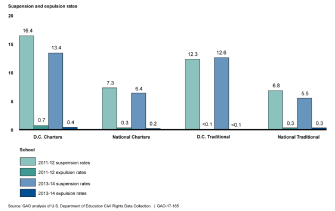Despite improvements over the last few years, the District of Columbia’s charter schools are still suspending and expelling students at significantly higher rates than the national average, according to a report from the U.S. Government Accountability Office.
And, echoing trends seen nationwide, black students and students with disabilities were also disciplined at disproportionately high rates.
Whether charter schools discipline students at higher rates than their district school counterparts is one of the most longstanding and contentious debates over the sector—a debate that is often focused on cities with large shares of charter school students, such as D.C.
Forty-five percent of D.C.'s public school students attend charters. Only New Orleans, Detroit, and Flint, Mich., have higher proportions, according to the National Alliance for Public Charter Schools.
Although the suspension rate for D.C.'s charter schools dropped from 16 to 13 percent between the 2011-12 and 2013-14 school years, those numbers are still double the rates of charter schools nationally, and slightly higher than D.C.'s district schools. The GAO used the Education Department’s biannual Civil Rights Data Collection to make the comparisons.

Furthermore, black charter school students were six times more likely to be suspended than white charter students, while students with disabilities were twice as likely to be suspend as their peers without disabilities. The report says similar trends are seen within D.C.'s district schools.
The report also found that discipline rates in D.C. were especially high in a handful of charter schools: 16 out of 105 charters suspended over a fifth of their students last school year.
See Also: Which Students Are Arrested the Most at School? An Education Week Analysis
The GAO is required by law to conduct a management review every five years of the city’s Public Charter School Board, which is in charge of authorizing new schools to open and shutting down poorly performing ones.
Although the Public Charter School Board has taken steps to reduce suspension and expulsion rates among charter schools, including publishing annual Equity Reports for families and the community, the GAO report identified other ongoing issues. The GAO says it saw “a lack of consensus around roles and responsibilities regarding charter school discipline” among the various agencies charged with overseeing the city’s charter schools. The report recommends those agencies clear up their roles and collaborate more to address the issue.
Related stories:
- Education Secretary to Charter Schools: It’s Time to Rethink Discipline
- Charters Suspend Blacks, Students With Disabilities More Than Peers
- Charters Still Serve Fewer Special Ed. Students, but are More Inclusive
Graph from United States Government Accountability Office Report to Congressional Committees, February 2017
